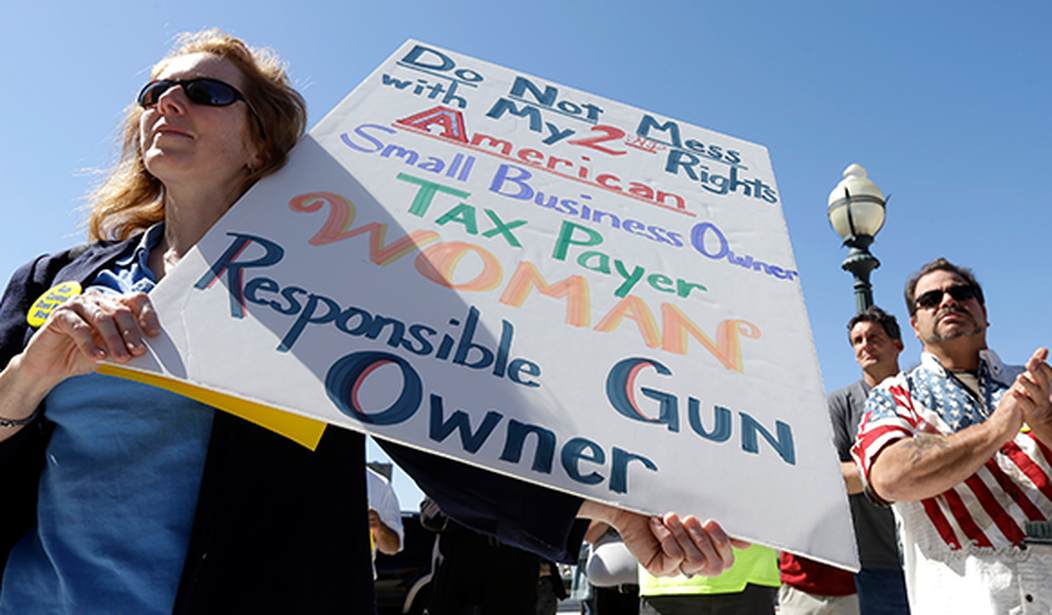As Democrats continue wandering through the political wilderness, there's no shortage of would-be guides claiming to offer a path back to political relevance and a governing majority in Washington, D.C., including a group called WelcomePAC, which has offered up a blueprint of sorts for Democratic candidates to follow in the midterm elections. One of their suggestions: quit talking so much about gun control.
Politico reported on the 58-page document produced by WelcomePAC this week, noting that figures on the left from David Axelrod to James Carville had a hand in shaping its recommendations. While the report doesn't delve too deeply into Second Amendment issues, the authors are clear that current Democratic messaging on gun control isn't helping them woo any voters outside the wealthy and "highly educated" part of their base.
In comparison to working-class voters, swing voters, and the general electorate, highly educated Democrats assign significantly greater importance to issues like climate change, guns, political division, voting rights, and income inequality, and significantly less importance to issues like border security, immigration, crime, gas prices, and the budget deficit.
The results are similar when we look by income. Democrats who make more than$150,000 a year place a higher priority on issues like climate change (+23%), guns(+17%), and income inequality (+11%) in comparison to the average voter. At the same time, wealthier Democrats place a lower priority than the general electorate on issues like border security (-27%), crime (-13%), and gas prices (-10%).
These differences suggest that the significant—and growing—influence of highly educated and affluent voters on the Democratic Party’s agenda and message may be responsible for the Democratic Party shifting its priorities away from more salient, material issues (as we saw in Part 1), as well as for voters’ perceptions that Democrats are not focused on the right issues.
These results also indicate that increasing the influence of working-class voters on the Democratic Party’s agenda and message would likely mean making issues like crime, gas prices, border security, and the cost of living a higher priority and making issues like political division, guns, climate change, and voting rights a lower priority.
This echoes comments from anti-gun senator Chris Murphy, who recently proclaimed that Democrats shouldn't have litmus tests on issues like gun control, though it arguably goes even further than Murphy's remarks. The Connecticut senator still made it clear that, while Democratic candidates shouldn't have to be dogmatic on issues like gun control, the party itself should still embrace more restrictions on our right to keep and bear arms
WelcomePAC, on the other hand, argues that Democrats need to quit focusing on issues like gun control and instead prioritize issues like public safety, while also embracing economic populist positions like "expanding access to public health care, making the wealthy 'pay their fair share' in taxes and raising the minimum wage."
Convince voters that we share their priorities by focusing more on issues voters do not think our party prioritizes highly enough (the economy, the cost of living, health care, border security, public safety), and focusing less on issues voters think we place too much emphasis on (climate change, democracy, abortion, identity and cultural issues)... Moderate our positions where our agenda is unpopular, including on issues like immigration, public safety, energy production, and some identity and cultural issues.
Note that the report isn't calling on Democrats to do a complete 180 on gun issues. Instead, it recommends that Dems "moderate" their positions that are unpopular with voters. The gun control lobby will argue that their plans to ban so-called assault weapons and large capacity magazines, restrict concealed carry, and jack up taxes on NFA items are all broadly popular among American voters and that there's no need for Democrats to recalibrate their positions on gun control, but despite what public polling might say there's no evidence whatsoever that support for those positions has led to Democrats making any inroads in state or national elections.
After the Covenant School shooting in Nashville in 2023, for instance, Democrats made a huge showing of support for gun control, including leading demonstrations on the floor of the state House. Democrats across the state made gun control a key part of their 2024 campaigns, declaring that Republican inaction was putting children at risk. Democratic Senate candidate Gloria Johnson, for instance, was one of three state House members disciplined for leading those gun control protests in the House chamber.
How did she fare? She got clobbered by Sen. Marsha Blackburn, winning just 34% of the vote. Tennessee's eight Republican congressional representatives all won re-election (as did Steve Cohen, the lone Tennessee Democrat in Congress). And in the state legislature, Democrats failed to flip a single seat in either the House or Senate.
It makes sense for Democratic strategists to argue that the party should stop talking so much about gun control and even moderate its positions. The problem, though, is that moderation isn't enough to win over gun-owning voters. If a candidate declares they're not in favor of a semi-auto ban but are in favor of gun rationing laws, increased training requirements to keep and bear arms, and "red flag" statutes that allow for the confiscation of firearms with little or no due process protections, that's not going to satisfy or sooth 2A voters. But if Democrats start to actively support the Second Amendment, that will cost them support among their base... and the well-funded gun control lobby that spends tens of millions of dollars backing pro-gun control Democratic candidates.
I don't think Democrats are willing or ready to wean themselves from the financial teats of anti-gun billionaires like George Soros and Michael Bloomberg, even if that would help them make inroads with voters in middle America. Instead, I suspect we'll see some changes in messaging in the midterm election cycle, but the fundamental tenets of their anti-gun ideology will remain intact even if they're pushed into the shadows.










